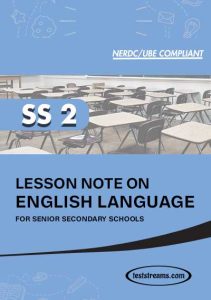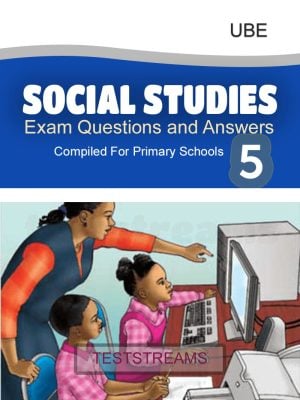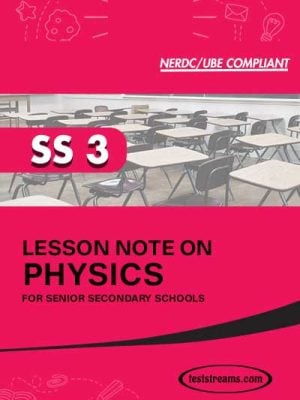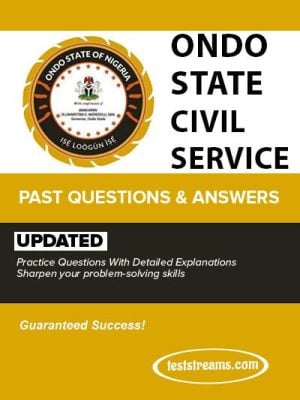This English Language Lesson Note was pulled from our book (Lesson Note on English Language for SS2 MS-WORD); Compiled to serve as reference material to help teachers draw out their lesson plan easier, saving you valuable time to focus on the core job of teaching.
This English Language Lesson Note Covers The Following Topics
- PARTS OF SPEECH REVISION
- ORACY SKILLS – PURE VOWELS, ARTICLES, AND WRITING SKILL
- DIPHTHONGS, DETERMINERS, AND WRITING SKILL
- CONJUNCTIONS, FORMAL LETTERS, AND POETRY
- CONSONANTS; SENTENCES; VOCABULARY DEVELOPMENT
- WORD FORMS, INFORMAL LETTERS, AND WRITING EXPOSITION
- WORD STRESS, PUNCTUATION, AND SPEECH WRITING.
- ARGUMENTATIVE ESSAY, ACTIVE/PASSIVE VOICE, AND WORD STRESS
- NOMINALIZATION AND SKILL FOCUS (PARAPHRASING A POEM)
- NOMINALIZATION OF ADJECTIVES AND VERBS
- WORDS ASSOCIATED WITH THE HUMAN BODY SYSTEM AND FUNCTIONS
- RELATIVE PRONOUN: WHO, WHOSE, WHICH ETC; WORDS ASSOCIATED WITH BUILDING AND BUILDING CONSTRUCTION
- SPEECH WORK: UNSTRESSED VOWELS
- PLURAL FORMS OF NOUNS (THE RULES)
- SPEECH WORK (ORAL): MAKING A TOAST DURING CELEBRATION; READING TO SUMMARIZE AN ARGUMENT
- WORD MODIFIERS (ADJECTIVAL AND ADVERBIAL)
- COMPLEX SENTENCES ANALYSIS: FEATURES OF
- COMPLEX SENTENCES
- READING TO PARAPHRASE POEMS: KEY WORDS ASSOCIATED WITH DRAMATIC WORKS; PHRASAL VERBS WITH TWO PARTICLES
- POSSESSIVE APOSTROPHE
- COMPREHENSION/VOCABULARY DEVELOPMENT:
- READING TO GRASP SENTENCE PARAGRAPH TRADITION
- ESSAY WRITING: FORMAL LETTER; SENTENCE TYPES
- INFORMAL LETTER; WORDS ASSOCIATED WITH THE ENVIRONMENT; READING FOR IMPLIED MEANING
- SUMMARY WRITING; TYPES OF PRONOUNS; SPEECH
- WORK: RHYME SCHEME
- COMPREHENSION/VOCABULARY DEVELOPMENT: READING TO GRASP SENTENCE PARAGRAPH TRADITION
- REPORTED SPEECH AND RHYMES
- CONTRASTING CONSONANTS AND PRONOUNS
- (DEMONSTRATIVE & POSSESSIVE)
- REPORT WRITING AND WORD STRESS
- WRITING OF MINUTES AND INTONATION
- ADVERBS
- READING FOR CRITICAL EVALUATION; INTRODUCTION TO SEQUENCE OF TENSE
- LEXIS AND STRUCTURE: PHRASAL VERBS
- POSSESSIVE APOSTROPHE
- SUBORDINATE CLAUSE AND SKILL FOCUS
- SENTENCES: CONDITIONAL CLAUSE; WORDS ASSOCIATED WITH PUBLISHING AND PRINTING
- PREFIXES AS WORD EXTENSION; VERB
- FORMS: ACTIVE AND PASSIVE VERBS
- ESSAY WRITING- ARGUMENTATIVE ESSAY; GRAMMAR: THE RULES OF CONCORD
- SPEECH WRITING; VOCABULARY ASSOCIATED
- WITH BANKING; INFLECTIONAL PREFIXES
- ADVERBS
- PREPOSITIONAL PHRASES; VOCABULARIES
- ASSOCIATED WITH HOTEL AND CATERING
- IDIOMS; VOCABULARY: WORDS ASSOCIATED
- WITH POLITICS AND GOVERNANCE
- SPEECH WORK: NASAL CONSONANTS;
- STRUCTURE: ADJECTIVAL CLAUSE
Sample note
Week 1
Topic– PARTS OF SPEECH REVISION
Contents:
Revision on Parts of Speech: Nouns, Verbs, Adjectives, Adverbs, Conjunction, Verbs, Interjection, Pronoun.
Introduction
The indispensable aspect of a language you cannot ignore if you want to be an authority in the language are the Parts of Speech.
A part of speech is a category into which words are placed according to the functions they perform in a sentence. Every word that makes up a sentence, phrase or clause belongs to a part of speech.
Nouns
A noun is often defined as a word which names a person, place or thing. Here are some examples of nouns: boy, river, friend, Mexico, triangle, day, school, truth, university, idea, John F. Kennedy, movie, aunt, vacation, eye, dream, j7flag, teacher, class, grammar. John is a noun because it is the name of a person; Mexico is a noun because it is the name of a place; and boy is a noun because it is the name of a thing. Noun has different forms and functions. They are either proper or Improper. Common nouns are either countable or uncountable.
Pronouns
A word (one of the traditional parts of speech) that takes the place of a noun, noun phrase, or noun clause, A pronoun can function as a subject, object, or complement in a sentence. Unlike nouns, pronouns rarely allow modification.
There are different classes of Pronouns: Demonstrative, Personal, Intensive, Interrogative and Possessive.
Adjectives
Adjectives are the part of speech (or word class) that modify a noun or a pronoun.
In addition to their basic (or positive) forms (for example, big and beautiful), most descriptive adjectives have two other forms: comparative (bigger and more beautiful) and superlative (biggest and most beautiful). Different types of pronoun: Qualitative, Quantitative and Denominal.
Verbs
A verb is a part of speech (or word class) that describes an action or occurrence or indicates a state of being. Generally, it makes more sense to define a verb by what it does than by what it is. Just as the “same” word (rain or snow, for example) can serve as either a noun or a verb, the same verb can play a number of different roles depending on how it’s used.
Put simply, verbs move our sentences along in a variety of ways.
Types of verbs: regular and irregular, transitive and intransitive, finite and non-finite, auxiliary and lexical, dynamic and stative.
Adverbs
An adverb is the part of speech (or word class) that is primarily used to modify a verb, adjective, or other adverb. Adverbs can also modify prepositional phrases, subordinate clauses, and complete sentences.
Prepositions
A Preposition is a word (one of the parts of speech) that shows the relationship between a noun or pronoun and other words in a sentence.
Conjunction
A conjunction is the part of speech that serves to connect words, phrases, clauses, or sentences. The common conjunctions — and, but, for, or, nor, yet, and so — join the elements of a coordinate structure. Types of conjunction: Subordinating and coordinating.
Interjection
An Interjection is a short utterance that usually expresses emotion and is capable of standing alone. Interjections are generally considered one of the parts of speech.
In writing, an interjection is sometimes followed by an exclamation point. You might use an interjection to express surprise (Wow!), confusion (Huh?), or outrage (No!). You may use interjections in casual and in creative writing. You should not use interjections in formal writing, like book reports and research papers.

Get the complete Lesson Note with more content at very affordable price. Lesson Note on ENGLISH for SS2 MS-WORD- PDF
![]()








